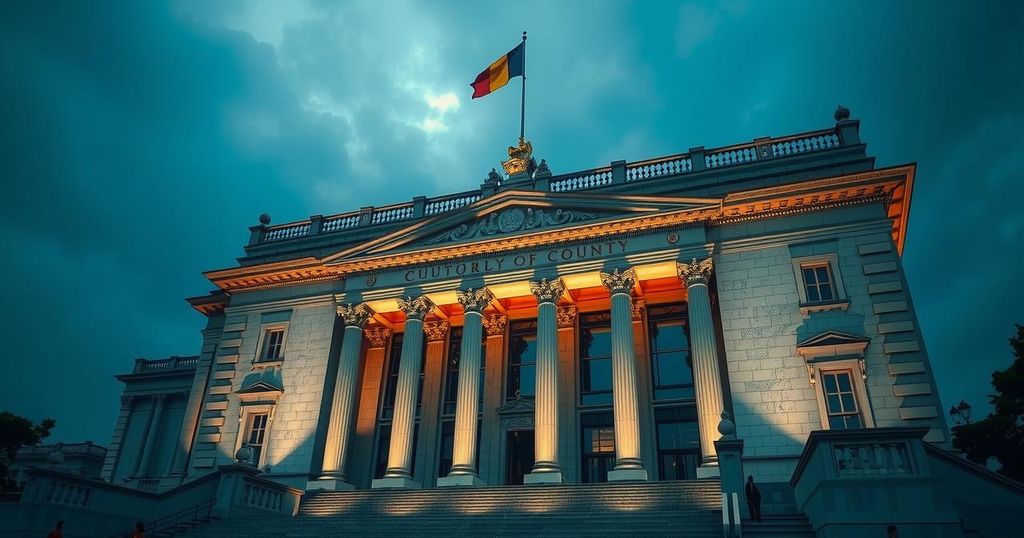International Criminal Court Intensifies Investigations in the Democratic Republic of Congo

On October 14, 2023, ICC Prosecutor Karim Khan announced intensified investigations in the DRC, focusing on crimes in North Kivu since January 2022. This effort, in response to a request from the Congolese government, aims to address severe human rights violations, including those by the M23 armed group. Human Rights Watch has advocated for broader accountability, including high-ranking officials. The ICC seeks support from member states to fulfill its broader mandate while acknowledging its role as a court of last resort, emphasizing the need for an internationalized justice mechanism in the DRC.
On October 14, 2023, Karim A. A. Khan, the Prosecutor of the International Criminal Court (ICC), announced a significant escalation in investigative efforts within the Democratic Republic of Congo (DRC), concentrating on crimes committed in the North Kivu province since January 2022. This initiative follows a request made by the Congolese government to the ICC last year seeking intervention. The ICC has been actively investigating serious violations of human rights and international humanitarian law in the DRC since 2004, following an initial appeal from the Congolese authorities. This long-standing inquiry has resulted in the prosecution of six individuals, all former leaders of armed groups. Notably, four were tried for atrocities in Ituri province that occurred during 2002-2003, yielding three convictions and one acquittal. Conversely, two other cases pertaining to crimes in North Kivu in 2009 never progressed to trial. Human Rights Watch has continuously urged the ICC to broaden its scope of accountability to include not only rebel commanders but also high-ranking officials from the DRC, Rwanda, and Uganda who may have been complicit in grave human rights abuses over the years. The renewed investigation by the ICC could provide a significant opportunity to address the longstanding issue of accountability and bridge the impunity gap that permits egregious violations throughout North Kivu, Ituri, and beyond. Reports indicate that severe violations of the laws of war persist in the DRC. Human Rights Watch has documented horrific acts perpetrated by the M23 armed group, including the killing of civilians, acts of gang rape, plunder, and the obliteration of property. In 2024, incidents escalated as the Rwandan army and the M23 launched indiscriminate shelling of displacement camps and densely populated areas near Goma, raising alarms about civilian safety. Concurrently, the Congolese military and collaborating militias exacerbated the peril faced by displaced persons by deploying heavy artillery close to these camps. Acts of murder, sexual violence, and arbitrary detentions were also reported among the Congolese soldiers and allied fighters, targeting the vulnerable displaced communities. Prosecutor Khan has expressed his commitment to thoroughly investigate all parties engaged in these hostilities, notwithstanding the Congolese government’s request to narrowly focus on the M23 group. Member countries of the ICC are encouraged to acknowledge the increasing demands on the court and extend the necessary support to enable the ICC to fulfill its mandated responsibilities effectively. Nonetheless, it must be articulated that the ICC is a court of last resort, unable to address all issues independently. The prosecutor’s statement commended the Congolese authorities for their establishment of a committee aimed at creating a special criminal court in the DRC. The advent of an internationalized justice mechanism, complementing both the ICC’s efforts and domestic courts, is critically overdue and is expected to significantly mitigate the existing impunity gap. It is imperative that the Congolese government expedites this initiative with the cooperation of the ICC and other international stakeholders.
The Democratic Republic of Congo has been embroiled in conflict and human rights violations for decades. The ICC became involved following requests from the Congolese government, leading to investigations aimed at addressing serious crimes committed during various conflicts. Numerous armed groups and military factions continue to operate in the country, leading to widespread atrocities against civilians. Human Rights Watch and other organizations have consistently called for greater accountability, urging the ICC to expand investigations to include not only armed groups but also other parties involved in these conflicts, including state actors.
In conclusion, the ICC’s renewed investigative focus on the Democratic Republic of Congo represents a vital step toward accountability for widespread and serious human rights violations occurring in the region. By addressing the complex layers of complicity that extend beyond rebel groups to include governmental and military officials, there lies a potential to profoundly impact the ongoing impunity and promote justice for the victims. The establishment of an internationalized justice mechanism in tandem with the ICC’s efforts may prove essential in the long-term pursuit of peace and reconciliation in the DRC.
Original Source: www.hrw.org








